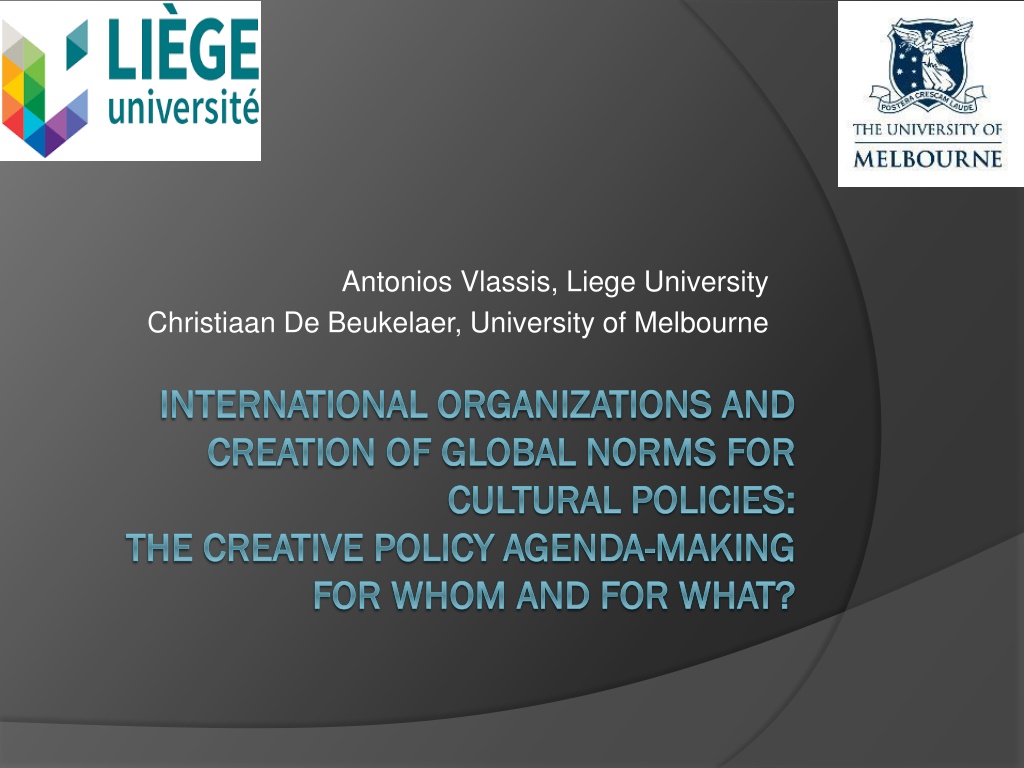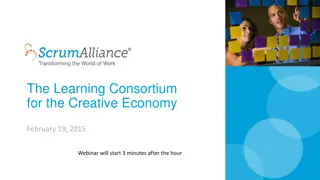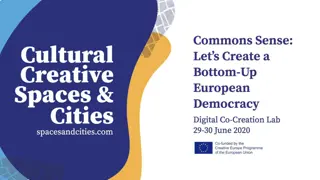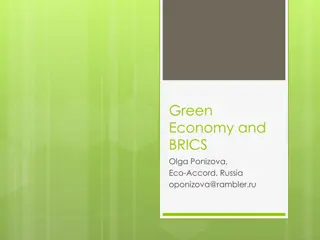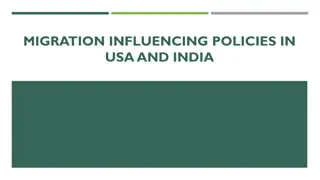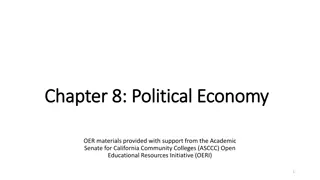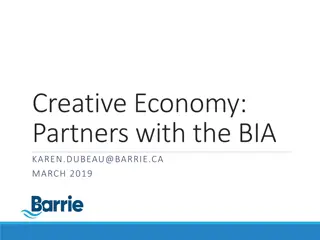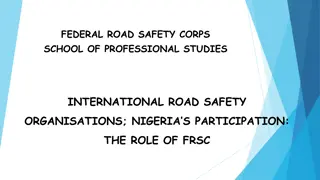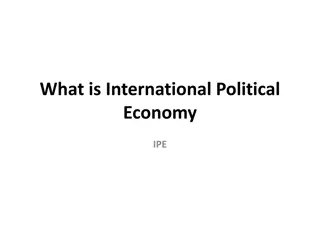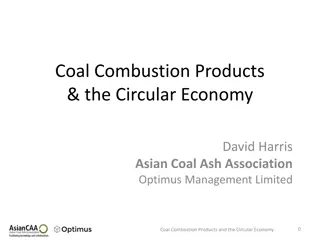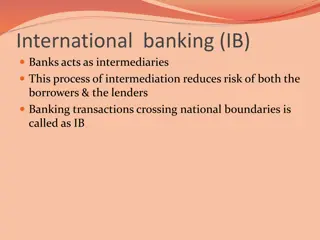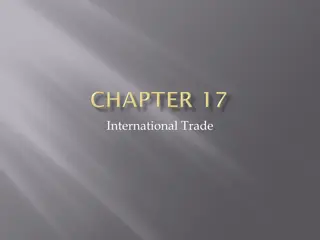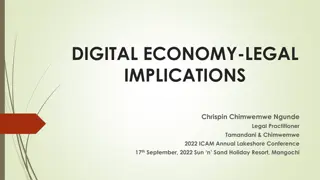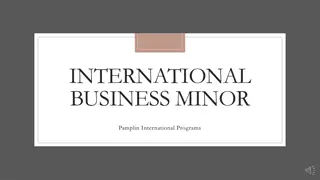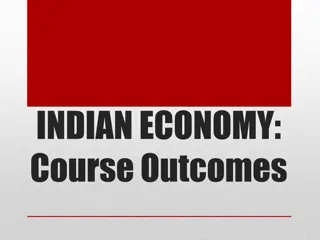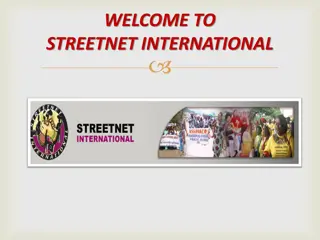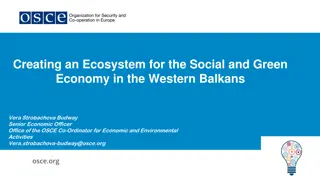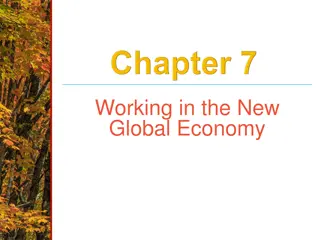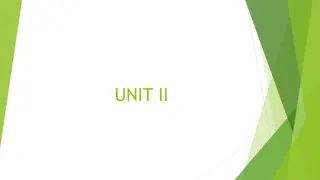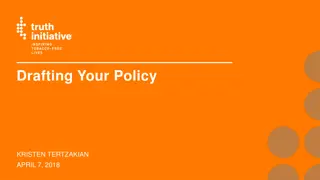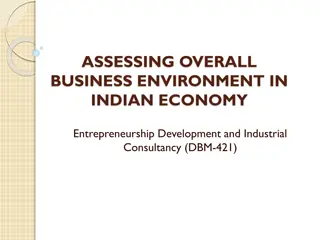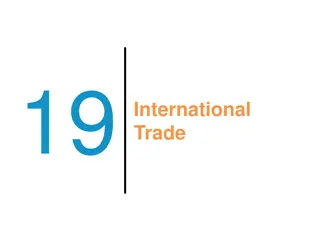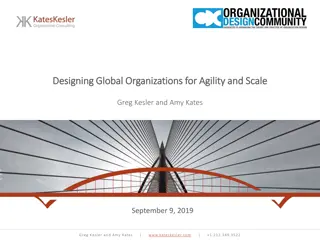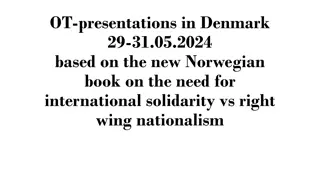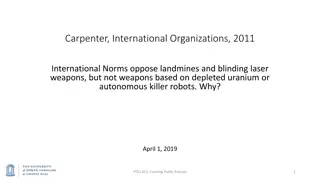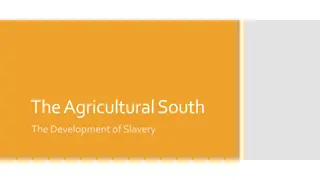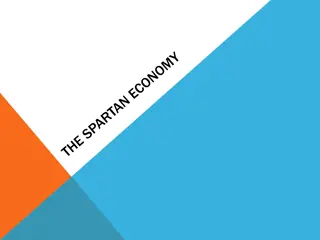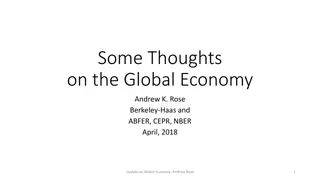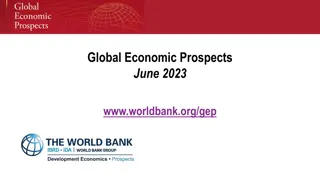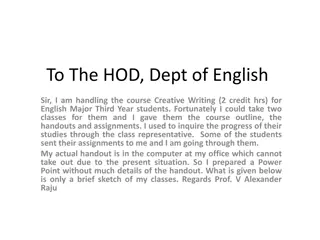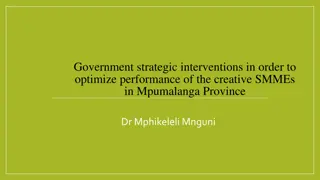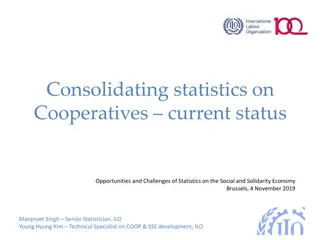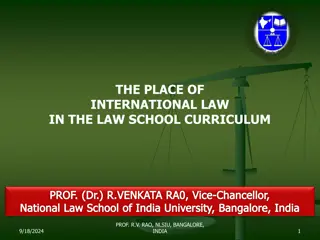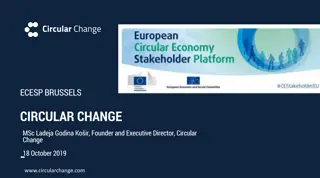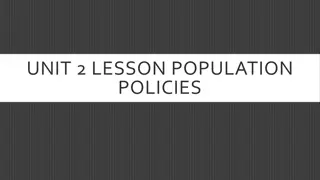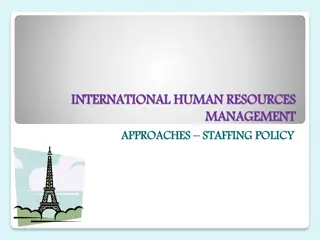Understanding the Role of International Organizations in Shaping Global Creative Economy Policies
Exploring the link between International Organizations (IOs) and the creative economy policy agenda, this research delves into the socio-political aspects to identify key actors and the driving forces influencing the introduction of creative economy concepts in various IO policy agendas.
Download Presentation

Please find below an Image/Link to download the presentation.
The content on the website is provided AS IS for your information and personal use only. It may not be sold, licensed, or shared on other websites without obtaining consent from the author. Download presentation by click this link. If you encounter any issues during the download, it is possible that the publisher has removed the file from their server.
E N D
Presentation Transcript
Antonios Vlassis, Liege University Christiaan De Beukelaer, University of Melbourne INTERNATIONAL ORGANIZATIONS AND INTERNATIONAL ORGANIZATIONS AND CREATION OF GLOBAL NORMS FOR CREATION OF GLOBAL NORMS FOR CULTURAL POLICIES: CULTURAL POLICIES: THE CREATIVE POLICY AGENDA THE CREATIVE POLICY AGENDA- -MAKING FOR WHOM AND FOR WHAT? FOR WHOM AND FOR WHAT? MAKING
INTRODUCTION How is it that worldwide models emerge and spread? How do nations learn about each other s strategies and how do they enter the agenda of national politics and policymaking? Since nations value uniqueness and independence, how is it possible that they nevertheless seem to follow or imitate each other? What is the role of international organisations in this? (Alasuutari 2016: 2) The aim is to explore the last question, with one particular policy concept in mind: the Creative Economy. Creative Economy Reports, three editions, 2008, 2010, 2013 United Nations Conference on Trade and Development (UNCTAD), UNESCO, UN Development Program (UNDP)
INTRODUCTION Explore the link between International Organizations (IOs) and creative economy policy agenda setting Socio-political analysis, favouring an actor-centred institutionalism Open the black box of international policy making regarding the creative economy reports in order to identify the key actors and the rationales that drove the introduction of creative economy in the policy agenda of several IOs Document analysis and ten semi-structured interviews Four main parts
THE CREATIVE ECONOMY: INSTITUTIONAL PERSPECTIVES Year Organisation Report Focus 2008 UNCTAD & UNDP The Challenge of Assessing the Creative Economy: Towards Informed Policy-Making Creative Economy: A Feasible 2010 UNCTAD & UNDP Development Option Special Edition: Widening 2013 UNESCO & UNDP Development Pathways Creative Economy: The New 2017 (?) UNCTAD & ? Generation Sustainable Growth Sectors The objectives of UNCTAD (fostering development through trade) and UNESCO (connecting countries societies through education, science, and culture) require very different approaches
BUILDING AN INTERNATIONAL POLICY AGENDA ON CREATIVE ECONOMY The power of an IO comes not from the more traditional trappings of state power, but from its ability to claim authority through expertise. The changing context of technological convergence and informational society enabled a UN agenda on creative industries to be elaborated. Active involvement of the UNCTAD Leadership of UNCTAD secretariat and of Rubens Ricupero, former UNCTAD Secretary-General from 1995 to 2004, former Brazilian minister of finance UNCTAD XI Conference held in Brazil in 2004 One of three cross-cutting informal high-level panels organized at the initiative of the UNCTAD Secretariat to the topic of creative industries and development Sao Paulo Consensus, adopted by 153 Member States, The international community should support national efforts of developing countries to increase their participation in and benefit from dynamic sectors and to foster, protect and promote their creative industries After the UNCTAD XI Conference in Brazil, the Secretary General of the latter set up the UN multi-agency informal group on Creative Industries: UNCTAD, UNESCO, WIPO, ILO, UNDP, International Trade Center
CREATING A COMMON UN PERSPECTIVE? UNESCO had engaged with cultural industries (as distinct from, but related to the creative economy) in relation to development in the late 20th century in a variety of ways. But UNCTAD brought the concept of creative economy into the mainstream economic development agenda in the early 2000s. The objective was to set up a database to get evidence on this area The goal of UNCTAD was to justify its leadership, to leave its mark on the topic and to address it through the development perspective and the orientations of its mandate. it is very difficult to talk about the impact of creative industries in the global economy if we have no numbers (Interview with a high-ranking official, UNCTAD) UNCTAD was faced with a political dilemma Several bureaucratic infightings about the scope of the report, the definition of creative industries and the methodology of database It is very beautiful to talk about synergies, cooperation among agencies, but in practice, it is not easy (Interview with a high-ranking official, UNCTAD). UNESCO and WIPO have not subscribed to the conclusions of the reports; the ILO did not contribute to the report due to several administrative issues and movement of staff
The diffusion of 2008 and 2010 creative economy reports The 2008 and 2010 reports rested on two principles: framing the development dimension of the creative economy through trade diversification and emphasizing a macroeconomic approach through the elaboration of statistical database. Creative economy has been transformed from a rather national issue for some governments into a concern of international politics - and it has been reintroduced by the UNCTAD s activities within the agendas of several actors involved These reports helped to give more visibility to these sectors as economic sectors and to give more possibility to integrate them to the national strategies on development. Before, the culture was seen as a sector depending on subsidies. We could not see the impact of your investment in this sector, it was invisible (Interview with a high-ranking official, UNCTAD). Throughout the period 2008-2012, UNCTAD became a key interlocutor of national governments and of IOs regarding the creative industries. Several conferences and meetings put the creative economy on their agenda and UNCTAD continued its own advocacy, playing an essential role in disseminating the results of the reports to stakeholders.
Political reinterpretations of creative economy The key question of the third edition was how to capture the vibrancy and scale of creative economies beyond economic indicators UNESCO s aim: To downplay the importance of a macroeconomic vision on creative economy and focused more and more on the local dimensions of the development through creative industries UNCTAD s involvement in creative economy issues has triggered a more competitive institutional context for UNESCO s work UNESCO s authority has been undermined by the UNCTAD s expanded activities The 2013 report was embedded into UNESCO previous experiences and normative framework of the organization To show that the agenda on creative industries has become increasingly institutionalised through several practices of the organisation. A key aspect, which favoured the UNESCO s decision to take the leadership about the creative economy reports: the international campaign for the inclusion of culture in the post-2015 UN development agenda The 2013 report should be one of the platforms for justifying the inclusion of culture in the post-2015 agenda (Interview with a high ranking official, UNESCO).
Conclusion the integration of creative economy in the IO s policy agenda cannot be understood as a purely state-led process. Related more to the particular interests and ambitions of the IOs administrations than to external political pressure from the member states. The creative economy making was based on the desire of these organisations to enhance their policy agenda, resources and their credibility within the UN system, lobbying for a better position of their policy approach in the multilateral discussions on development cooperation.
